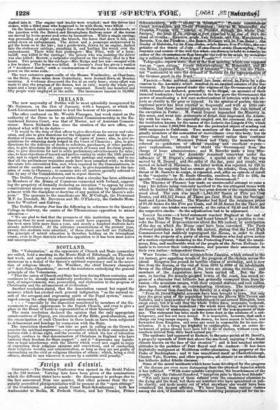SCOTLAND.
The " Voluntaries," as the opponents of Church and State connexion are milled, held a meeting in the Music-Hall of Edinburgh on.Thursday last week, and agreed Co :resolutions which while, politically loyal were strenuous in a denial of the Queen's spiritual supremacy and in the asser- tion 'of religious: liberty.:,. Dr. Wardlaw, the chief literary champion of " Anti-State-Churchism,",moved the resolution embodying the general principle 'of the Voluntaries, " That the union. of Church and State has been during fifteen centuries, and continues to be, directly and indirectly productive, to an immeasurable ex- tent, of reisgoverenient, war, pereeeution, and obstruction to the progress of Christianity and the advancement of civilization." Another resolution 040, that the Association cannot but regard the pleasure which has excited such general indignation " as the natural re- sult of the arrogant, and engrossing spirit of the Papal system," encou- raged among the other things generally enumerated, - - - "especially by the disposition manifested by members of the Go- vernment to grant endewments to the Popish Church, and even to give a pier-eh' the Houlie'of 'Lords 'tb representatives of their hierarchy."
The main resolution _declared the opinion that the only appropriate counteractives of Popery,Stre Circulation of the Bible, good education, and the emancipation of such Churches in these lands as have been subjected to debasement and bondage by connexion with the State.
The Association therefore " can take no cart in calling on the Crown to exercise the spirituelsupremacy,—a prerogative which in their estimation in- terferes with a divine right, and the exercise of which the law of toleration happily confines to that!deeomination of Christians in England who have bartered their freedom for State support" ; and it " deprecates any legisla- tive or legal interferenee. with the liberty which every sect ought to enjoy of expressing their ,religieus opinions. and convictions, and of conducting their religious worship and administration, so long as they are not guilty of encreashing on the. civil or religious liberties of others; which, being a civil -.offence, should be met wherever it occurs by a suitable civil penalty."


























 Previous page
Previous page